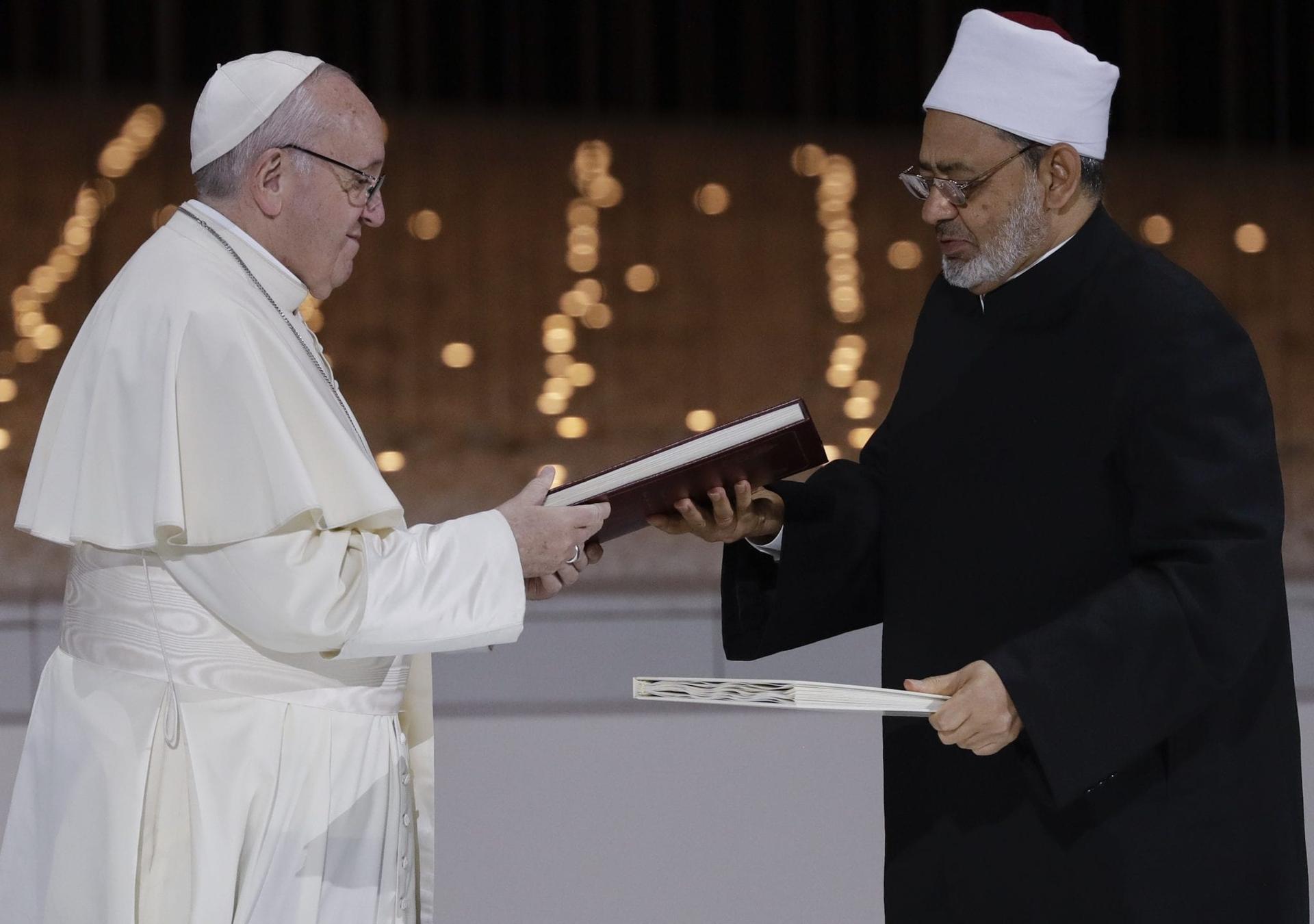ROME – Pope Francis on Thursday joined the Grand Imam of Al-Azhar University and the head of the United Nations to celebrate the first International Day on Human Fraternity, in which the pontiff defined fraternity as the “new frontier” of humanity.
“We are siblings, or we destroy each other,” Francis said. “Today, there’s no time for indifference. We cannot wash our hands. With distance, with disregard, with contempt. Either we are brothers, or everything comes crumbling down.”
Fraternity, the pope said, “is the frontier. The frontier on which we have to build; is the challenge of our century, is the challenge of our time. Fraternity means an outstretched hand, fraternity means respect.”
But he said fraternity does not mean an amalgamation of beliefs: “Fraternity means firmness in one’s own convictions,” Francis said. “Because there’s no true fraternity if you negotiate you own convictions. We are siblings, born of the same Father. With different cultures, traditions, but all brothers.”
Fraternity, he insisted, is built respecting differences, not negotiating them.
Participating in the event were Ahmad al-Tayyeb, the Grand Imam of Cairo’s Al-Azhar University, arguably the closest thing to a Vatican in the Sunni Islamic world; the crown prince of Abu Dhabi, Mohammed bin Zayed; and Antonio Guterres, the Secretary General of the United Nations.
The date for the yearly encounter was set last December by the United Nation’s General Assembly, to coincide with the anniversary of Pope Francis’s historic 2019 trip to United Arab Emirates, when he and al-Tayyeb signed the Document on Human Fraternity for World Peace and Coexistence.
The World Day of Human Fraternity were inspired by that declaration and Francis’s 2020 encyclical Fratelli Tutti, in which he shares his vision for a post-COVID-19 world.
During his video-taped remarks, Francis referred to al-Tayyeb as his “brother, friend, partner in challenges and risks in the fight towards fraternity.”
“Your testimony helped me a lot because it was a courageous one,” Francis said. “I know it was not an easy task. But with you, we were able to do it together, and help each other.”
“You believed in the project. You believed,” he said.
Anglican Archbishop Justin Welby of Canterbury and the President of the European Council Charles Michel sent pre-recorded videos to the event.
“The more we see each other from afar, the more we see our differences,” Michel said. “But the more we look each other in the eye, the more we see our own reflection, our common humanity. Dialogue inspires understanding, understanding inspires tolerance, and tolerance leads to respect. This virtues chain is what makes peace and fraternity possible.”
“[The declaration] an inspiring document that calls upon to what we can do together, and calls us to act in solidarity for one another,” Welby said. “It’s friendship that matters in changing what we do. May we all develop such friendships, so we can work together.”
In the introduction to the day of reflection and the award, Michaëlle Jean, former Governor General of Canada, also praised the declaration, referring to it as a “call to rediscover the values of peace, justice, goodness, beauty, human fraternity and coexistence.”
In his message, Francis said a world without brothers is a world of enemies.
“We cannot say: Brothers or not brothers. Let’s say it as it is: Brothers or enemies,” the pope said.
“War is not the only thing needed to build enemies. Disregarding others is enough. This technique, this attitude of looking the other way, treating the other as if they didn’t exist.”
During the ceremony Guterres was awarded the 2021 Zayed Award for Human Fraternity, along with Latifa Ibn Ziaten.
The 61-years-old mother of five is the founder of the Imad for Youth and Peace Association, named after her son, a soldier killed by Mohammed Merah, a terrorist who murdered seven people, including three children, in a series of shootings in France in 2012.
She created the association after a meeting with Merah, which she said allowed her to enter into the world of a young man who had never managed to integrate into society after arriving in France as a migrant from Algeria.
“Thank you for your testimony,” Francis told her. “And thank you for being the mother of your son, of so many boys and girls, for being the mother today of this humanity that is listening to you and learns from you: either the path of fraternity, of brotherhood, or we lose everything.”
Follow Inés San Martín on Twitter: @inesanma














